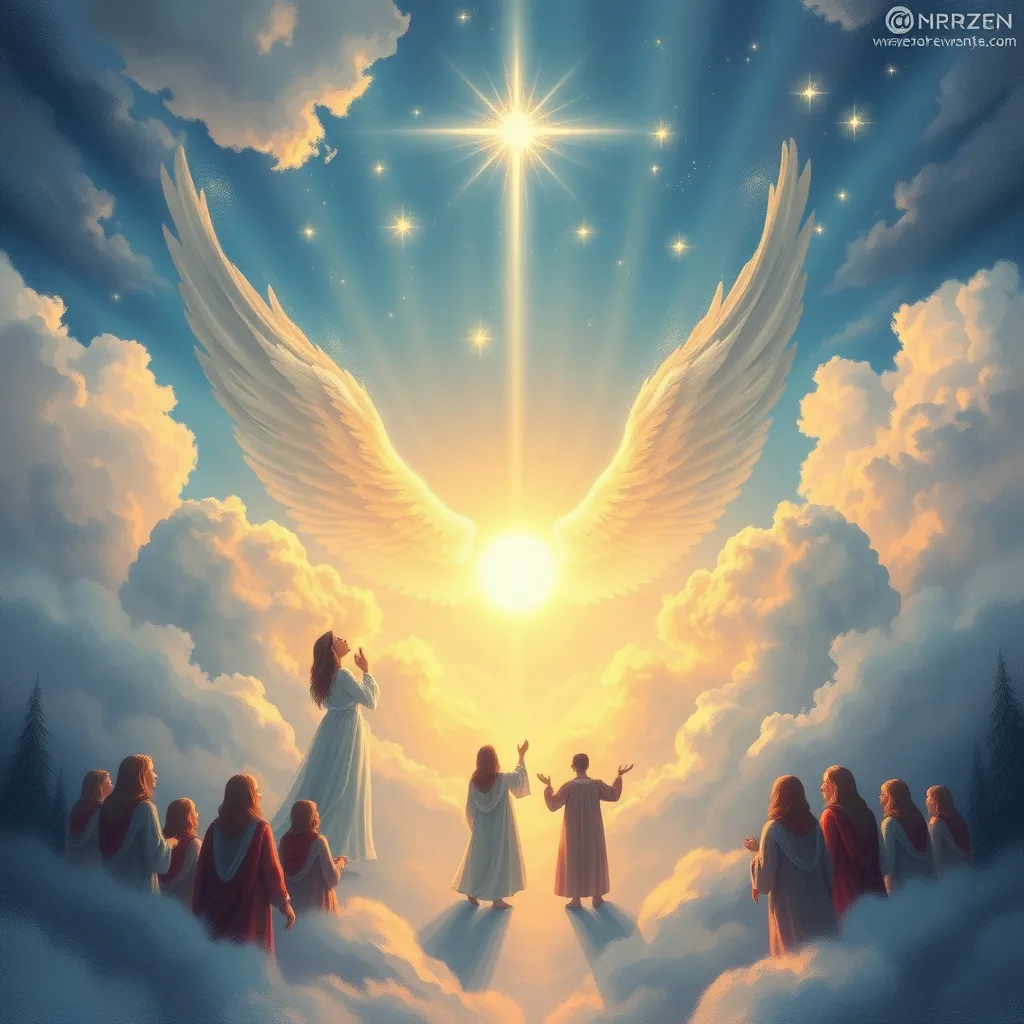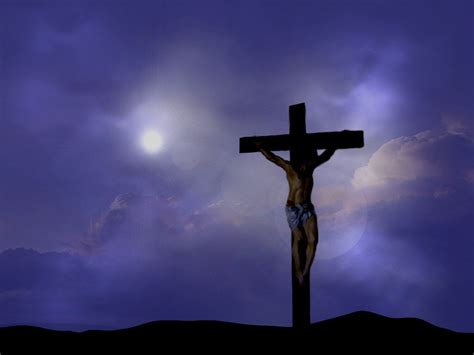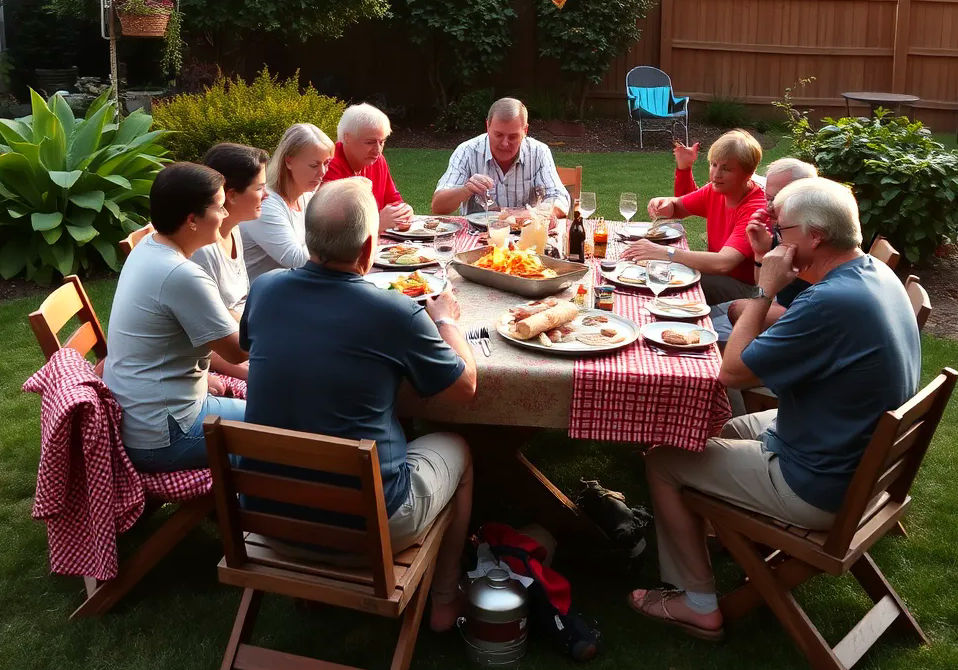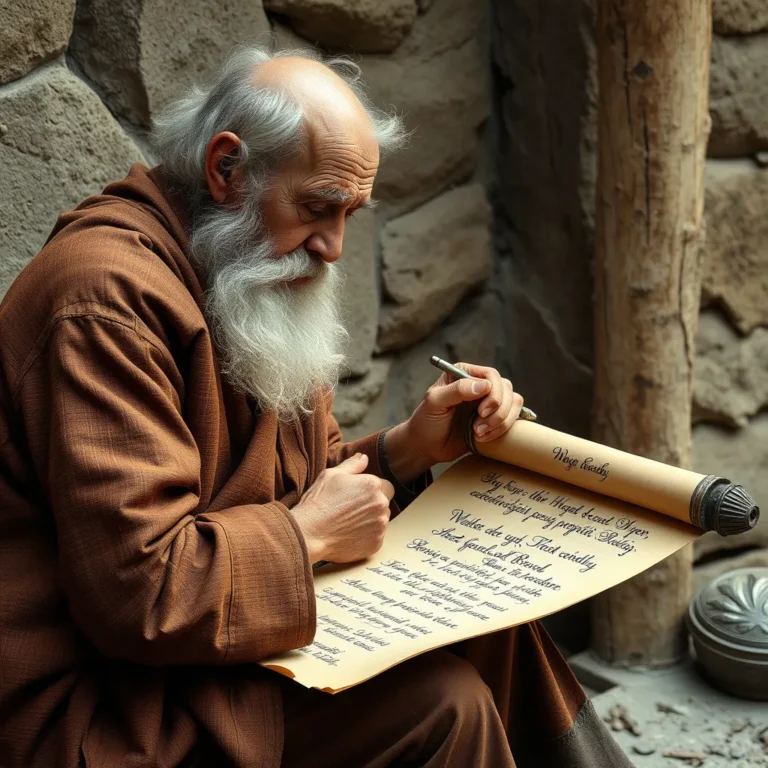
(*All Bible verses are from the NIV unless otherwise noted)
Chapter 5:9-14
9 And they sang a new song, saying: “You are worthy to take the scroll and to open its seals, because you were slain, and with your blood you purchased for God persons from every tribe and language and people and nation.
10 You have made them to be a kingdom and priests to serve our God, and they will reign on the earth.”
11 Then I looked and heard the voice of many angels, numbering thousands upon thousands, and ten thousand times ten thousand. They encircled the throne and the living creatures and the elders.
12 In a loud voice they were saying: “Worthy is the Lamb, who was slain, to receive power and wealth and wisdom and strength and honor and glory and praise!”
13 Then I heard every creature in heaven and on earth and under the earth and on the sea, and all that is in them, saying: “To him who sits on the throne and to the Lamb be praise and honor and glory and power, for ever and ever!”
14 The four living creatures said, “Amen,” and the elders fell down and worshiped.
Rev 5:9
And they sang a new song, saying, “You are worthy to take the scroll and to open its seals, because you were slain and with your blood you purchased for God persons from every tribe and language and people and nation :
The “new song” is referred to seven times in the Old Testament:
Psa 33:3 Sing to him a new song; play skillfully, and shout for joy.
Psa 40:3 He put a new song in my mouth,a hymn of praise to our God. Many will see and fear the LORD and put their trust in him.
Psa 96:1 Sing to the LORD a new song; sing to the LORD, all the earth.
Ps 98:1 Sing to the LORD a new song, for he has done marvelous things; his right hand and his holy arm have worked salvation for him.
Psa 144:9 I will sing a new song to you, my God; on the ten-stringed lyre I will make music to you,
Psa 149:1 Praise the LORD. Sing to the LORD a new song, his praise in the assembly of his faithful people.
Isa 42:10 Sing to the LORD a new song, his praise from the ends of the earth, you who go down to the sea, and all that is in it, you islands, and all who live in them.
These “new songs” are songs of praise that fill the hearts of those who have been redeemed, who have found healing for brokenness and hurt, and who have discovered new life in a covenant relationship with God!
Rev 5:9
And with your blood you purchased men for God from every tribe and language and people and nation:
Matt 20:28 …just as the Son of Man did not come to be served, but to serve, and to give his life as a ransom for many.”
1Tim 2:5 For there is one God and one mediator between God and mankind, the man Christ Jesus, 6 who gave himself as a ransom for all people…

Titus 2:13 …while we wait for the blessed hope—the appearing of the glory of our great God and Savior, Jesus Christ, 14 who gave himself for us to redeem us from all wickedness and to purify for himself a people that are his very own, eager to do what is good.
The Hebrew word ga’al, redeem (as in Lev 25:25, and Gal 4:4-5,) means to buy back, to pay for, or to rescue from loss1. The term “redeem” was originally used to refer to a kinsman who took in the wife and children of his deceased relative to save them from destitution, or in other instances, to purchase a slave’s freedom.
Exod 6:6 “Therefore, say to the Israelites: ‘I am the LORD, and I will bring you out from under the yoke of the Egyptians. I will free you from being slaves to them, and I will redeem you with an outstretched arm and with mighty acts of judgment.
Lev 25:25 “ ‘If one of your fellow Israelites becomes poor and sells some of their property, their nearest relative is to come and redeem what they have sold.
Ruth 3:13 Stay here for the night, and in the morning if he wants to do his duty as your guardian-redeemer, good; let him redeem you. But if he is not willing, as surely as the LORD lives I will do it. Lie here until morning.”
This term accurately describes the necessity for Christ’s death on the cross. If we need to be redeemed, then it means our human condition is one of spiritual loss and slavery. Loss and death of one sort or another always follow sin: death of faith, hope, and relationships; the despair of shame and guilt, and sometimes even physical death:
Rom 6:23 For the wages of sin is death, but the gift of God is eternal life in Christ Jesus our Lord.

Have you owned a pair of very comfortable shoes? You wear them, maybe for years. As they age, polishing and cleaning seem to renew their looks. It’s only when you buy a new pair of shoes and set them beside the old ones that you realize how worn and shabby they really look!
In much the same way, it’s only when we surrender and open ourselves to the ministry of the Holy Spirit that we truly begin to perceive the holiness of God. Only then will we have a clear realization of our sinfulness. That clarity is only made possible by the presence of His Spirit, which leads us to truth (John 16:13). When we finally acknowledge our “shabbiness” – that “polish” and new “shoelaces” aren’t going to fix the problem – do we begin to understand our need for a new life in relationship with God!
As that perception grows, the fact that Jesus died to pay the price for our mistakes begins to come into focus:
Isa 53:5 But he was pierced for our transgressions, he was crushed for our iniquities; the punishment that brought us peace was on him, and by his wounds we are healed.
Rom 5:8 But God demonstrates his own love for us in this: While we were still sinners, Christ died for us.
1Pet 2:24 “He himself bore our sins” in his body on the cross, so that we might die to sins and live for righteousness; “by his wounds you have been healed.”
Only then does sincere repentance become a part of our lives – the desire to change, to be better, to make life better for others.
Because of two great realities – the holiness of God and the sinfulness of humankind – atonement and redemption are made absolutely necessary if we are to be cleansed and brought into the Presence of God’s Perfect Love.
Jer 17:9 The heart is deceitful above all things and beyond cure. Who can understand it?
Gal 5:17 For the flesh desires what is contrary to the Spirit, and the Spirit what is contrary to the flesh. They are in conflict with each other, so that you are not to do whatever you want. 18 But if you are led by the Spirit, you are not under the law. 19 The acts of the flesh are obvious: sexual immorality, impurity and debauchery; 20 idolatry and witchcraft; hatred, discord, jealousy, fits of rage, selfish ambition, dissensions, factions 21 and envy; drunkenness, orgies, and the like. I warn you, as I did before, that those who live like this will not inherit the kingdom of God.
1John 1:8 If we claim to be without sin, we deceive ourselves and the truth is not in us.
Rom 7:18 For I know that good itself does not dwell in me, that is, in my sinful nature. For I have the desire to do what is good, but I cannot carry it out.
Consider our basic human needs such as food, water, shelter, money, and clothing; our sexual nature and instincts for safety and self-preservation. These things are good and necessary, but it’s over-desire for good things that, If left uncontrolled, becomes gluttony, greed, and the selfish acquisition of material wealth. If left unchecked, our natural sexual desires can become corrupted into lust and promiscuity, which, in turn, always leads to broken relationships and moral decay.

One definition of sin is the act of going against God and His ways. God’s ways are goodness, love, compassion, truthfulness, and self-sacrifice – the very antithesis of what we are drawn to because of our physical natures. If we are going against something, we are separate from it. By definition, then, sin separates us from God.
Eph 2:1 [NLT] Once you were dead because of your disobedience and your many sins. 2 You used to live in sin, just like the rest of the world, obeying the devil—the commander of the powers in the unseen world. He is the spirit at work in the hearts of those who refuse to obey God. 3 All of us used to live that way, following the passionate desires and inclinations of our sinful nature. By our very nature we were subject to God’s anger, just like everyone else. 4 But God is so rich in mercy, and he loved us so much, 5 that even though we were dead because of our sins, he gave us life when he raised Christ from the dead. (It is only by God’s grace that you have been saved!)
Eph 4:18 They are darkened in their understanding and separated from the life of God because of the ignorance that is in them due to the hardening of their hearts. 19 Having lost all sensitivity, they have given themselves over to sensuality so as to indulge in every kind of impurity, and they are full of greed.
Rom 7:18 For I know that good itself does not dwell in me, that is, in my sinful nature. For I have the desire to do what is good, but I cannot carry it out.
Since God is the creator and giver of life, separation from Him brings death in one form or another. Acting in opposition to God affects our faith, peace, hope, and relationship with others But through Christ, every day can be a fresh start, filled with new opportunities and hope!
2Cor 5:17 Therefore, if anyone is in Christ, the new creation has come: The old has gone, the new is here!
1Cor 5:7 Get rid of the old yeast, so that you may be a new unleavened batch—as you really are. For Christ, our Passover lamb, has been sacrificed.
Eph 4:22 You were taught, with regard to your former way of life, to put off your old self, which is being corrupted by its deceitful desires; 23 to be made new in the attitude of your minds; 24 and to put on the new self, created to be like God in true righteousness and holiness.
Col 3:9 Do not lie to each other, since you have taken off your old self with its practices 10 and have put on the new self, which is being renewed in knowledge in the image of its Creator.
1Pet 1:3 Praise be to the God and Father of our Lord Jesus Christ! In his great mercy he has given us new birth into a living hope through the resurrection of Jesus Christ from the dead,
Rev 5:10
You have made them to be a kingdom and priests:
Webster defines “kingdom” as a politically organized community or major territorial unit having a monarchical form of government headed by a king or queen. However, Jesus doesn’t seem to be talking about that kind of kingdom:

Luke 17:20-21 Once, on being asked by the Pharisees when the kingdom of God would come, Jesus replied, “The coming of the kingdom of God is not something that can be observed, 21 nor will people say, ‘Here it is,’ or ‘There it is,’ because the kingdom of God is in your midst [NLT: already among you,].”
Rom 14:17 For the kingdom of God is not a matter of eating and drinking, but of righteousness, peace, and joy in the Holy Spirit…
According to these passages, an individual or group becomes God’s kingdom when the Lord dwells among them—when His Spirit fills them with righteousness, peace, and joy!
(Rev 5:10) To serve our God:
In ancient Israel, the responsibility of the priests and Levites was caring for everything in the Tabernacle and Temple; The ark of the covenant, the menorah, the table of show-bread, the altar in the courtyard, and the daily sacrifices for atonement. The priests were responsible for keeping all the sacred objects used in their daily service before God clean and purified2.
For the Israelite priests, worship was not listening to a sermon or singing hymns as we think of worship today. It was performing acts of service before God. Their service was their daily act of worship.
According to Vine’s3 the Greek term latreia is akin to latreuo, primarily meaning “to serve.” In Scripture, it denotes “the service of God according to the requirements of the Levitical Law.”

Latreia can be translated as either “service” or “worship.” Consider these translations of Rom 12:1(emphasis mine):
KJV I beseech you therefore, brethren, by the mercies of God, that ye present your bodies a living sacrifice, holy, acceptable unto God, which is your reasonable service [latreia].
ESV I appeal to you therefore, brothers, by the mercies of God, to present your bodies as a living sacrifice, holy and acceptable to God, which is your spiritual worship [latreia].
And these translations of Heb 9:1
KJV Then verily the first covenant had also ordinances of divine service [latreia], and a worldly sanctuary.
NIV Now the first covenant had regulations for worship [latreia] and also an earthly sanctuary.
On Mount Sinai, God gave Moses the laws by which Israel was to live. These laws would set the Israelites apart from the other tribes and nations that surrounded them. These laws were given for several reasons:
- To reveal the holy and just nature of eternal God (Lev 19:2, 20:7-8).
- To set Israel apart from the pagan nations that surrounded them (Exod 19:5).
- To teach Israel the basic principles of right and wrong in living in relationship with others and with God.
- The sacrifices were to teach the people the concepts of forgiveness and mercy – essential characteristics of Almighty God – concepts to be mirrored in their relationships with others and with God (Lev 1-7).
- The yearly feasts and festivals were to provide a constant reminder of God’s goodness in delivering them from bondage in Egypt and the slavery of lawless living (Lev 23).
- The laws provided direction for the physical and spiritual health of the nation (Exod 21-23, Deut 6:4-19, Psa 119:97-104).
- The most important purpose of the Mosaic Law is that it revealed humanity’s fallen and sinful state and the need for redemption. The Law reveals the standard of holiness and teaches that sin is separation from God. Paul summed it up this way:
Rom 7:7 [NLT] “… In fact, it was the law that showed me my sin. I would never have known that coveting is wrong if the law had not said, “You must not covet.”

The people of Israel followed the pattern of celebrating holy festivals, taking offerings of grain and animals to the Temple, and following the rules Moses gave them. But over the centuries, the purpose of those laws was largely forgotten. Simply following the laws became an end in themselves, and the pattern of right relationship with God and others was lost. The scribes and Temple rulers taught that following the laws justified humanity before God.
Jesus boldly pushed back on these erroneous teachings:
Matt 23:23 “Woe to you, teachers of the law and Pharisees, you hypocrites! You give a tenth of your spices—mint, dill and cumin. But you have neglected the more important matters of the law—justice, mercy and faithfulness. You should have practiced the latter, without neglecting the former.
Christians run the risk of falling into this same pattern. Many have been taught that “worship” is something to do on Sunday mornings or on special occasions, and doing so keeps them right before God. While our songs and prayers are a fragrant offering acceptable and pleasing to God, according to the Scriptures, the acts of kindness, generosity, and love that we show to others are the true forms of worship and the most meaningful expressions of religion that God values:
Hos 6:6 For I desire mercy, not sacrifice, and acknowledgment of God rather than burnt offerings.
James 1:27 Religion that God our Father accepts as pure and faultless is this: to look after orphans and widows in their distress and to keep oneself from being polluted by the world.
Matt 25:35 For I was hungry and you gave me something to eat, I was thirsty and you gave me something to drink, I was a stranger and you invited me in, 36 I needed clothes and you clothed me, I was sick and you looked after me, I was in prison and you came to visit me.’ 37 “Then the righteous will answer him, ‘Lord, when did we see you hungry and feed you, or thirsty and give you something to drink? 38 When did we see you a stranger and invite you in, or needing clothes and clothe you? 39 When did we see you sick or in prison and go to visit you?’ 40 “The King will reply, ‘Truly I tell you, whatever you did for one of the least of these brothers and sisters of mine, you did for me.’
In this sense, the “kingdom of God” is truly among us, and we are a living priesthood, worshiping God through our service to others:
1Pet 2:5 …you also, like living stones, are being built into a spiritual house to be a holy priesthood, offering spiritual sacrifices acceptable to God through Jesus Christ. 6 For in Scripture it says: “See, I lay a stone in Zion, a chosen and precious cornerstone, and the one who trusts in him will never be put to shame.” 7 Now to you who believe, this stone is precious. But to those who do not believe, “The stone the builders rejected has become the cornerstone,” 8 and, “A stone that causes people to stumble and a rock that makes them fall.” They stumble because they disobey the message—which is also what they were destined for. 9 But you are a chosen people, a royal priesthood, a holy nation, God’s special possession, that you may declare the praises of him who called you out of darkness into his wonderful light.
Rev 5:10
They will reign on the earth:
To reign means to rule. Taken literally, this verse would imply that believers will be in charge of others, will command others, and have authority over others. While many Christians hold political and community offices of authority, the spiritual act of “ruling” suggests something more:
Jas 4:7 Submit yourselves, then, to God. Resist the devil, and he will flee from you.
1John 4:4 You, dear children, are from God and have overcome them, because the one who is in you is greater than the one who is in the world.
2Cor 10:3 For though we live in the world, we do not wage war as the world does. 4 The weapons we fight with are not the weapons of the world. On the contrary, they have divine power to demolish strongholds. 5 We demolish arguments and every pretension that sets itself up against the knowledge of God, and we take captive every thought to make it obedient to Christ.
In a spiritual sense, God has given mankind the authority to “over-rule” Satan; to demolish his attempts to enslave and hold us captive; to crush his lies and deceptions, and to take captive every deceitful thought! There is no greater way to rule the world!
Rev 5: 11 Then I looked and heard the voice of many angels, numbering thousands upon thousands, and ten thousand times ten thousand. They encircled the throne and the living creatures and the elders.
12 In a loud voice they were saying: “Worthy is the Lamb, who was slain, to receive power and wealth and wisdom and strength and honor and glory and praise!”
13 Then I heard every creature in heaven and on earth and under the earth and on the sea, and all that is in them, saying: “To him who sits on the throne and to the Lamb be praise and honor and glory and power, for ever and ever!”
14 The four living creatures said, “Amen,” and the elders fell down and worshiped.
Footnotes
- Strong’s H1350, and G1805. ↩︎
- Beth Elohenu, Messianic Congregation, http://blog.bethelohenu.org/2016/09/the-responsibilities-of-the-priests-of-israel-and-the-levites/, retrieved October 4, 2022. ↩︎
- Vine’s Expository Dictionary of New Testament Words. ↩︎
*All Scripture quotations, unless otherwise indicated, are taken from the Holy Bible, New International Version®, NIV®. Copyright ©1973, 1978, 1984, 2011 by Biblica, Inc.™ Used by permission of Zondervan. All rights reserved worldwide. www.zondervan.comThe “NIV” and “New International Version” are trademarks registered in the United States Patent and Trademark Office by Biblica, Inc.™





